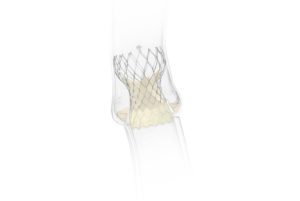
Medtronic has announced results from an interim analysis of the first 171 patients (including 71 roll-ins) treated in the OPTIMIZE PRO clinical study.
The post-market, prospective, multicentre study is evaluating procedural outcomes (including pacemaker rates) associated with procedure-related techniques and post-procedure transcatheter aortic valve implant (TAVI) care pathways when using the self-expanding, supra-annular Evolut PRO and PRO+ TAVI systems in patients with symptomatic severe aortic stenosis. The interim data was presented virtually at the Society for Cardiovascular Angiography and Interventions 2021 scientific sessions (SCAI 2021, 28 April–1 May, virtual).
Study investigators utilised several procedural approaches with the Evolut TAVI system in the study, including the “cusp overlap technique,” which is designed to help implanters assess and achieve the target implant depth in an effort to reduce interaction with the conduction system.
At 30 days, excellent safety outcomes were observed with zero death or disabling stroke and a low pacemaker rate (8.8%). Additionally, the Evolut platform showed excellent hemodynamic (blood flow) performance with low mean gradients (8.1 mm Hg) and low rates of residual total aortic regurgitation with the majority of subjects having none/trace (80.4%), and the rest mild (19.6%) at discharge. Patients also experienced an expedited discharge with a median hospital length of stay of one day.
The OPTIMIZE PRO study utilises a TAVR care pathway to evaluate common practices and shared experiences such as conscious sedation and early mobilisation. A conduction disturbance pathway evaluates efficiencies and heart team considerations for monitoring and managing patients with conduction disturbance who might be considered for a pacemaker post-TAVI.
“The evolution of TAVI requires that we refine aspects of the procedure and post-procedure care pathways to improve patient outcomes,” said Kendra Grubb, surgical director of the Structural Heart and Valve Center at Emory Healthcare in Atlanta, USA and co-principal investigator in the OPTIMIZE PRO study who presented the data at the meeting. “Interim results from this study demonstrate improvements, like low pacemaker rates and next-day discharge, and are supportive of the hypothesis that the cusp overlap technique can improve patient care.”
The OPTIMIZE PRO study is being conducted at 46 study sites in the USA and Canada and up to 15 sites in Europe. The primary endpoint includes the rate of all-cause mortality or all-stroke at 30 days with secondary endpoints of discharge time, percentage of patients with more than moderate aortic regurgitation, and the rate of pacemaker implant for new-onset or worsening conduction disturbance at 30 days. The study will also evaluate rehospitalisation rates and discharge time at 30 days and one year.
“As a leader in transcatheter valves therapies, we are committed to helping implanting centres standardise and further refine their TAVI care pathways to improve patient outcomes,” said Nina Goodheart, president of the Structural Heart & Aortic business, which is part of the Cardiovascular Portfolio at Medtronic. “In addition to helping us better understand the site-driven dynamics around conduction disturbance post-TAVI, the study also allows us to generate additional evidence around the Evolut PRO and PRO+ system’s advanced sealing skirt and its impact on paravalvular leak.”
The Evolut TAVI platform, including the Evolut R, Evolut PRO and Evolut PRO+ TAVI System, is indicated for symptomatic severe aortic stenosis patients across all risk categories (extreme, high, intermediate and low) in the USA. The Evolut PRO and PRO+ valves feature an outer tissue wrap that adds surface area contact between the valve and the native aortic annulus to further advance valve sealing.












